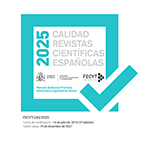'The Merchant of Venice': of ghettoes, spaces, ethics and its treatment in the higher education classroom
Abstract
In times of political uncertainty in Europe and the rest of the world, it is our intention in this work to recover the spatial dimension and the singular spatiality of The Merchant of Venice (1600) for the analysis of this work in the higher education classroom, that is, the teacher training setting. Within this framework the subject of our inquiries and didactic proposals will centre around the dramatic text of William Shakespeare, the film version directed by Michael Radford (2004) and the documentary Imagine … Shylock's Ghost (2015). Our objective in the analysis of the Venetian space of The Merchant of Venice is to update and reinstate some senses of what has been called an "ethics of the ghetto", understanding by this what Stephen Greenblatt and Shaul Bassi called "a lived cultural space, a lived religious space, ". In this sense, our aspirations are twofold: on the one hand, to problematise the referential process that leads students to identify, in a univocal and irreducible way, the Venice of the work with a space today mostly characterized by a mono tourist culture and, on the other, to direct their reading trajectories and pedagogical practice towards spaces of lasting commitments with the dignity of the other.
Downloads
Article download
License
In order to support the global exchange of knowledge, the journal Didáctica. Lengua y Literatura is allowing unrestricted access to its content as from its publication in this electronic edition, and as such it is an open-access journal. The originals published in this journal are the property of the Complutense University of Madrid and any reproduction thereof in full or in part must cite the source. All content is distributed under a Creative Commons Attribution 4.0 use and distribution licence (CC BY 4.0). This circumstance must be expressly stated in these terms where necessary. You can view the summary and the complete legal text of the licence.










